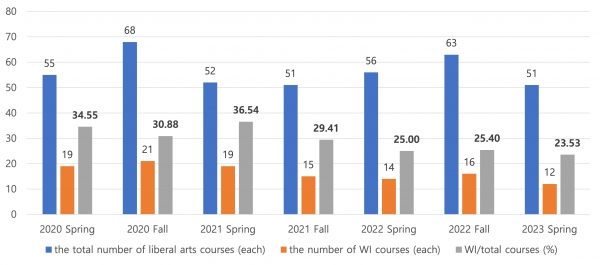
Last December, two letters about the Writing-Intensive (WI) classes were uploaded to the POSTECH Lounge and drew the attention of many students. The WI requirement has steadily caused a lot of problems such as unnecessary load on specific subjects, curriculum planning, and so forth. Recently, the WI class that opened this spring semester has markedly decreased and received complaints from students who must immediately satisfy the graduation requirements.
The WI requirement was established as a required course for students entering after 2018 to improve their writing skills. In WI classes, writing assignments are added to some liberal arts subjects. However, the WI requirement was abolished for students entering after 2021, and naturally, the frequency of WI class openings also decreased. During this process, it was pointed out that it is disadvantageous for students who must delay taking classes due to various reasons like military service.
Accordingly, the Students Committee On Pedagogy & Education (SCOPE) launched an inquiry about the reduction of the course capacity. They tracked the status of WI openings, surveyed students' opinions, and conveyed it to the Division of Humanities and Social Sciences (HSS) by holding a meeting. In addition, last fall semester, the military credit system was also promoted.
In 2021, SCOPE tried to retroactively abolish the WI requirement for students who entered POSTECH in 2020, but otherwise maintain the number of WI classes. While holding a meeting with HSS, they were guaranteed enough WI classes instead. However, only 70% of that number were opened in 2021. It not only reduces the diversity of subjects but also makes it difficult for students registering for courses due to the limited capacity. Students who return to school after a leave of absence will have more difficulties in taking classes if this trend continues.
In the case of students in the military, it turned out that they were concerned that WI placements would decrease after returning to school. According to SCOPE, 21 students replied that they had at least one class to take among a total of 27 respondents. All of them said they should be able to take classes through the military credit system. Accordingly, SCOPE suggested to HSS that military credit should be given for taking WI courses.
HSS replied that the number of subjects was inevitably reduced because only full-time professors were in charge of WI classes to ensure the quality of the classes. They also said that although the number of courses has decreased, there will be no further reduction in courses as the courses for full-time professors will continue to be maintained. However, it was pointed out that students did not have a complaint about WI's quality, but HSS pushed to shrink the capacity, which caused even greater dissatisfaction. Moreover, they rejected SCOPE's request for adding WI to the military credit system, saying that there are no liberal arts subjects in that system and consequently no WI.
SCOPE plans to discuss again whether it is possible to increase the number of WI courses by removing the rule that only full-time professors can create WI classes. Even as the number of WI students decreases, they also plan to suggest that the number of courses be maintained to guarantee the right to choose courses. As for the case of military students, SCOPE said that, “Not adding WI subjects to the military credit system will add to the concerns of military students.”
Meanwhile, HSS has also been criticized in other liberal arts subjects for having a much smaller number of available seats for students. It is to be seen on what kind of changes they will show to WI students, who are in the minority now.


